EQUINE WELFARE NETWORK PROFILE
Sunshine Horses Inc.
https://www.sunshinehorses.org

Sunshine Horses Inc.
3721 Verplank Road
CLAY, NY 13041
Mailing Address:
3721 Verplank Road
CLAY, NY 13041
Phone: 315-456-9380
MAKE AN INQUIRY
View our WEBSITE
EIN: 43-2046806Founded: 2003
View our PHOTO GALLERY
Profile Last Updated December 14, 2025Public Charity
NEXT CHAPTERS! Click here to view listings of our adoptable equines: Arts Super Star (Tazz) - Atomic Blast (Tommy) - B. Rustler - Before I Die (Haas) - Bos Laughin - Buttercup - Currahee - DanceForTheMoney (Tina) - Destiny Joe (Joey) - Falcon Run - LetHerRipTaterChip (Tater) - Molly Monet - Nasty Gal (Fancy) - Skyline (Sky) - Summer

2025
The Guardian Seal of Transparency is awarded annually to recognize an organization's commitment to transparency and accountability by their willingness to make comprehensive data about their programs, horse care practices, and governance available for public scrutiny. The Guardian Seal of Transparency is NOT an endorsement.
Awarded Annually
Last Updated: September 21, 2025
Last Updated: September 21, 2025
Sunshine Horses Inc. has not attained the Guardian designation for 2026.
DK Miss America (Dawn)
Our Equine Ambassador

DK Miss America is a very special equine Standardbred ambassador at Sunshine Horses. She represents the mild mannerisms of this breed. Dawn was saved from slaughter many years ago, actually pulled off the truck. The woman that saved her was named Dawn, hence the name Sunshine Horses chose for this mare. She had been adopted but then returned through no fault of her own. Because of her kind, patient nature the organization uses her for horse/human bonding with visitors and volunteers. She loves the attention. Recently, Dawn was diagnosed with glaucoma and requires daily medication and an ultraviolet protection mask to prevent further damage. The enclosed photo shows her with her mask as she interacts with one of our younger volunteers.
MISSION & PROGRAMS
Mission:Sunshine Horses,Inc. overall mission is Helping Horses, Helping People.
We are an independent (501c3) adoption/transition/retirement/sanctuary organization committed to rescuing, rehabilitating, schooling and re-homing horses, with particular interest placed on Standardbred Aftercare (transitioning from racing to a second career). Our organization also provides a haven for those unable to be adopted.
We do this while teaching our volunteers and those within at least 19 different community organizations and the general public about the horse/human bond; studies have shown, as well as we have witnessed, they can be our healers and partners. As we work with the horses, we have found they enrich and empower our lives and offer us opportunities for personal growth.
Our organization provides programs involved with equine rescue, adoption & retirement
Our organization provides outreach and/or public education programs involving horses.
100% of our total programs and services are equine-related.
Our organization is directly responsible for the care and shelter of equines involved in our programs.
Our organization does not CURRENTLY use satellite, overflow, foster, and/or outreach facilities.
Please describe what steps your organization takes to ensure that:
1) all interactions between your equines and people are mutually beneficial and conducted in accordance with the Guidelines for Human-Equine Interactions stated below;
2) all equines in the care of our organization and/or equines that participate in the organization's program have access to clean drinking water at all times; nutritious food in sufficient quantity, including natural forage such as pasture grass and/or hay; appropriate veterinary, farrier, and dental care; shelter and protection from the weather; sufficient safe space to move around comfortably on a daily basis; and daily opportunity to freely interact and have contact with other equines:
Sunshine Horses, Inc. is an accredited organization. We follow the gold standards put forth by Global Federation of Animal Sanctuaries. These parallel the guidelines of the American Association of Equine Practitioners for Rescues. We have developed policies and procedures, based on these guidelines, covering every aspect of equine care, directing and guiding our volunteers when providing the utmost in care. Our standardization policy, that follows our policies and procedures, was issued to maintain continuity and consistancy, among the shifts, when caring for the horses.
The policies we follow for programs and activities involving human/equine interaction always consider the comfort and dignity of the horse. The educational piece that we promote to the volunteers and public is that the horse is a partner and not a commodity.
When presenting our programs we gear it so as not to cause any stress on the horses. We place great emphasis on creating a safe environment for the horse and human. The comfort and dignity of the horse is of greatest importance. Consideration is also placed on the age and temperament of the horse. A time element for the event is also figured into this. The program is conducted by an experienced, knowledgeable volunteer who has the authority to remove the horse from an event if it shows any signs of distress.
Equine Transition Services:
Overview of our programs involved with rescue, rehabilitation, retraining, re-homing and/or retirement:
Sunshine Horses, Inc. takes in horses from all breeds and backgrounds. However, we specialize in Standardbreds and have one of the leading Standardbred aftercare programs in New York State. In 2022, we proudly transitioned from verification to accreditation with Global Federation of Animal Sanctuaries. Since 2019, we have followed their gold standards and guidelines as well as the guidelines from the American Association of Equine Practitioners. Our documented policies and procedures are based on these standards. We are also accredited by the Standardbred Transition Alliance for the last several years, we partake in their retired harness racing placement program. In addition, we continue to accept horses from the kill pen. Our organization plays a special roll in being their lifeline to a second career.
When the horses come into our program, they are rehabilitated when necessary and schooled under saddle to improve their adoptability. We take special pride in matching each horse with its potential adopter in hopes of finding their "forever home". We try to ensure a good fit between horse and human. Each adopter completes an inquiry form, as well as an extensive application. Several references are required and then verified. We also perform a farm check and visit the stables where the horse will be living. Finally, there is a binding adoption contract that is reviewed with each adopter, requiring their signature. Included within this contract are stipulations there is to be no breeding, no racing, nor selling at auction, nor shipping over the border for slaughter. They are also required to have an annual vet check with results sent to Sunshine Horses. If deemed necessary, we will perform a home check at any time. We have returned to our original contract from previous years. This requires all adopted horses be returned to Sunshine Horses, Inc. if the adopter, for whatever reason, can no longer keep the horse. Our organization is no longer providing the adopter the ability to sell, gift or transfer the horse to another. We have come to believe our present contract provides the best safety net for the life of the horse.
Horses remain with us if they are not adopted. We have several horses that are companion only and not rideable. We also provide a sanctuary and haven for those that are old with chronic conditions.
Sunshine Horses, Inc. continually engages with the community through schools, public events, open house, annual Onondaga Farm Fest, as well as other engagements. We discuss the many hardships horses endure, we teach about humane equine education, animal welfare and ways to protect the American horses. We discuss the joy they can bring to our lives. the importance and ability of being able to create a horse/human bond as they become our healers and partners in life.
Outreach and/or Public Education:
Community Outreach and Education
Sunshine Horses, Inc. offers those within our community, by appointment, opportunities to visit our farm. Our experienced volunteers provide guided tours to individuals, clients from nursing homes, assisted living groups, scouts, businesses and schools. We discuss the reasons our organization was founded, its history, and our mission of Helping Horses, Helping People. We explain about our retired Standardbred racehorse aftercare program. This is where our organization provides rescue, rehabilitation, re-schooling and re-homing. Our explanation includes, there are a variety of equestrian disciplines. This, in turn, enhances each horse's adoptability and increasestheir chances of finding loving homes. Our goal is to find the perfect match between horse and adopter. We go on to explain, if the adoption is not successful the horse is returned to our organization. Within this explanation, we also address those horses who are unable to find adoptive families, as Sunshine Horses remains their lifelong sanctuary. On our farm they can live out the remainder of their days with dignity and compassion.
Intertwined in our many discussions our volunteers speak to our mission of Helping People and the special bond that can develop between horse and human. They relay the many stories where volunteers and adopters have personally experienced this wonderful connection; how in many ways the horses have enriched and helped them in their lives as they faced their own challenges.
We provide the same discussion when we travel to different community events as elementary and high schools, horse shows, local colleges, nursing homes, assisted living facilities, a hospice center and other affairs held within the surrounding counties. We take along our display material made up of organizational posters, brochures, a photo board, and graphs. When the occasion allows, which is most of the time, we travel with our program horses. It's always a delight introducing them to the public.
Although our organization is not involved with equine assisted therapy, we discuss the many programs that are provided within the community and around the country. There is a general lack of knowledge pertaining to how equines can provide a positive effect on those that are physically, emotionally and mentally disabled. Here, the horses become healers and partners in life.
We have found when giving our public presentations, there seems to be a general lack of knowledge regarding the perils and hardships horses can endure during their lifetime. Our discussion refers to the retired race horse and the need for their aftercare training to transition each horse for a second career in order to decrease their chances of heading to slaughter. We discuss the potential difficulties in re-homing horses. We go on to talk about the vast number of acres, whether it be farmland, forests or open land that is being sold for commercial, industrial or residential development. We further explain, this not only cuts into the land available for horses to roam, it reduces areas where the public can ride, as well as affecting the sources for hay and grain production. This all having a negative effect of the future of the American horse within our society.
Our other programs involve many disabled individuals, accompanied by their trained mentors. They participate in our volunteer programs, experiencing equine care. Their smiles beam from ear to ear as they assist with grooming, some singing to the horse as they brush the coat. Each one is positively affected by their interaction with the horse.
Our organization also works with youth community groups as well as those that are required to do community volunteer service. We provide this through the different high schools within the community. Also available, community service when convicted of a minor crime.
Research/Medical Use of Equines:
Our organization has never made, and would not ever consider making, equines available for research studies or medical training that involves invasive procedures and/or that which may cause pain or suffering to the equine.
Religious Affiliation:
Our organization does not promote religious education, religious purposes, or a specific religious faith or use donations for religious education or religious purposes; require participants to be of a certain faith; require participation in religious, instruction, activities or services; or require participation in prayer, worship, religious instruction or other religious activities as a condition of receiving social or secular services offered.
Auction Donation:
Our organization has never allowed, or would not consider allowing, an equine to be sold, transferred, released, or otherwise placed into possession of any person or organization that would cause or allow the equine to be sold at auction for slaughter.
POLICIES: INTAKE, ASSESSMENT & TRAINING
Prior to a horse being accepted and/or arriving at the facility, the organization has the following policies in place:The owner of a potential equine is interviewed over the phone or in person prior to seeing the equine
The equine is evaluated at its place of residence
The owner completes an application/contract which constitutes the agreement between the owner and our organization when the equine is acquired from the equine's owner other than by seizure or by abandonment
The owner is financially responsible for the shipping of the equine to and from the organization
If health records are not available or are out-of-date, our veterinarian will administer appropriate vaccinations
A health certificate signed by a veterinarian and dated no more than seven days prior to arrival is provided to our organization either prior to or upon arrival of the equine attesting to the health status of the equine
Not Checked:
Trial Period: Check all that apply:
Equines are not taken on trial
Upon intake, the organization has the following quarantine policy in place:
The equine is confined to a designated and separate area for isolation and quarantine at the facility for a prescribed period of time
Not Checked:
The equine is confined to a designated and separate area for isolation and quarantine off-site for a prescribed period of time
The equine is not quarantined
The equine is confined to a designated and separate area for isolation and quarantine off-site for a prescribed period of time
The equine is not quarantined
The typical length of quarantine is: 10 to 20 days
Following arrival of the equine at the facility, the following is performed:
Physical examination to include temperature, pulse and respiration by a veterinarian upon arrival
Physical examination to include temperature, pulse and respiration by a trained staff member upon arrival
A Henneke Body Conditioning Score or other body conditioning score is assigned by a veterinarian upon arrival
Photographs are taken of each equine upon arrival at the facility and kept with the equine's health records
Physical examination by a farrier
Physical examination by a dentist
The equine is microchipped if the equine has not been microchipped
Not Checked:
A Henneke Body Conditioning Score or other body conditioning score is assigned by a trained staff member upon arrival
A Henneke Body Conditioning Score or other body conditioning score is assigned by a trained staff member upon arrival
Horses are assessed for following skills and behaviors:
Retrieval from a pasture/paddock
Leading with a halter and lead rope
Temperament, disposition and attitude, such as rated from very calm to very high spirited
Saddling
Bridling
Lunging
Loading onto and unloading off a trailer
Mounting and dismounting
Riding at the walk
Riding at the trot
Riding at the canter
Tolerance to unusual objects and loud noises
Known vices, i.e., cribbing, biting, kicking, weaving, stall walking, etc
Grooming
Bathing
Clipping
Tolerance to multiple handlers at the same time
Not Checked:
Riding by a beginner and/or unbalanced rider
Jumping
Driving (Pulling a carriage)
Riding by a beginner and/or unbalanced rider
Jumping
Driving (Pulling a carriage)
Our organization has the following policies and procedures in place pertaining to the ongoing assessment of horses in its care:
Physical examination by a veterinarian at least annually
The Henneke Body Condition score or other body conditioning score is updated at least annually by the veterinarian
Vaccinations are administered at least annually
Photographs are taken of each equine annually and kept with the equine's health records
Equines at our facility may be treated by an equine chiropractor
Equines at our facility may be treated by an equine acupuncturist
Equines at our facility may be treated by an equine massage therapist
Equines at our facility may be treated by an equine nutritionist
Not Checked:
The Henneke Body Condition score or other body conditioning score is updated at least annually by a trained staff member
Photographs are taken of each equine monthly and kept with the equine's health records
The Henneke Body Condition score or other body conditioning score is updated at least annually by a trained staff member
Photographs are taken of each equine monthly and kept with the equine's health records
Our organization has the following policies and procedures in place pertaining to the weight-carrying or workload capabilities of horses/equines that are ridden in our care:
Our organization evaluates the weight-carrying and workload limitations for each equine that is ridden at least annually
Our organization maintains a written record of the weight-carrying and workload limitations for each equine that is ridden
Not Checked:
Our organization does not evaluate the weight-carrying and workload limitations for each equine that is ridden
No equines are ridden; not applicable
Our organization does not evaluate the weight-carrying and workload limitations for each equine that is ridden
No equines are ridden; not applicable
The following variables are considered in determining the weight-carrying and workload limitations for each equine that is ridden:
Equine age, weight, breed, body condition, fitness, balance, health and soundness
Size, shape, condition and angle of the hooves
Participant weight, height, body proportions, balance, fitness and riding skills as well as behavioral issues and safety concerns
Weight and proper fit of the saddle and other equipment
Terrain and footing in the working environment
Duration and frequency of working sessions, as the frequency with which an equine is subjected to maximum weight carrying and/or workload
Nature and pace of work, repetitive or varied, radius of turns, degree of incline and regularity of footing when equine is subject to maximum weight-carrying capacity
Temperature and/or weather conditions
Seasonal impact on the equines' workload and weight-carrying capabilities and limitations
Not Checked:
Equine conformation to include the top line, length of back, strength and width of loin, bone density (measured by the circumference of the cannon bone just below the knee)
Our organization does not evaluate the weight-carrying and workload limitations for each equine that is ridden
No equines are ridden; not applicable
Equine conformation to include the top line, length of back, strength and width of loin, bone density (measured by the circumference of the cannon bone just below the knee)
Our organization does not evaluate the weight-carrying and workload limitations for each equine that is ridden
No equines are ridden; not applicable
Horses provided formal training (groundwork or riding): 2-3 times per week
Additional information about our intake, assessment & training policies and practices:
We require a coggins on all horses prior to entering our facility. However, with regards to the equines that were seized, a coggins will be done by our vet upon their arrival.
Any horse coming from the kill-pen is required to be tested twice for strangles.
We do request all previous vet records be sent with the horse, as well as attempt to receive a health certificate signed by a veterinarian within 7 days of the arrival.
Upon arrival at our facility, horses are placed in quarantine, a separate building from our herd, an admission assessment is completed in addition to daily shift check assessments for 2 weeks or more on the horses physical condition, unusual symptoms and adjustment. All of which is documented for our records. A veterinarian and farrier check is done upon arrival or within the first week.
POLICIES: BREEDING
The organization has the following policies related to breeding and stallions:Our organization does not conduct breeding of equines owned or under the care of our organization.
The main facility where our organization conducts its programs does NOT breed equines.
Not Checked:
One or more of the facilities where our organization conducts its programs, including foster/temporary care facilities, breeds equines
One or more of the facilities where our organization conducts its programs, including foster/temporary care facilities, are permitted to house stallions
One or more of the facilities where our organization conducts its programs, including foster/temporary care facilities, breeds equines
One or more of the facilities where our organization conducts its programs, including foster/temporary care facilities, are permitted to house stallions
Additional information about our breeding policies and practices:
Breeding is not allowed for any of our horses that are adopted, as stated in our adoption and placement contract.
POLICIES: EUTHANASIA
The organization has the following policies related to euthanasia:Our organization will never have an equine euthanized for space
Our organization will have an equine euthanized upon the recommendation of the veterinarian if the equine is a threat to itself, other equines, or people
Our organization will have an equine euthanized upon the recommendation of the veterinarian after all reasonable treatment options have been explored
Euthanasia is done on site when possible to decrease trauma from transport
Disposal of the carcass is handled within 24 hours
Not Checked:
Our organization will never have an equine euthanized under any circumstances
Euthanasia is done at the veterinarian's facility
Our organization will never have an equine euthanized under any circumstances
Euthanasia is done at the veterinarian's facility
The following are authorized to administer the procedure for your organization in accordance with state laws:
Veterinarian
Not Checked:
A certified euthanasia technician
Senior staff with appropriate training
Employee of animal control shelter or humane society with appropriate training
Veterinary student under the supervision of a licensed veterinarian
Not applicable. Our organization prohibits euthanasia under any circumstances
A certified euthanasia technician
Senior staff with appropriate training
Employee of animal control shelter or humane society with appropriate training
Veterinary student under the supervision of a licensed veterinarian
Not applicable. Our organization prohibits euthanasia under any circumstances
Additional information about our euthanasia policies and practices:
Our policies and procedures for euthanasia follow the standards of the American Association of Equine Practitioners.
POLICIES: RE-HOMING
View Re-homing AgreementOur organization has the following re-homing (adoption/purchase) policies and procedures in place:
All potential adopters/purchasers complete a written contract which constitutes the agreement between our organization and the new owner
Potential adopters/purchasers must visit our organization and be observed with the equine on site
The distance of a potential adopter/purchaser's home from our facility is a consideration for when re-homing an equine
Our organization conducts a site visit of the adopter/purchaser's facility before the transfer of the equine to the adopter/purchaser's facility
Not Checked:
Our organization does NOT re-home an equine to first time equine owners
Our organization will only re-home an equine to a location where another equine resides
Potential adopters/purchasers are encouraged to do a short-term, on-site foster with the equine
Adopters/purchasers are NOT required to provide updates
Our organization does NOT re-home an equine to first time equine owners
Our organization will only re-home an equine to a location where another equine resides
Potential adopters/purchasers are encouraged to do a short-term, on-site foster with the equine
Adopters/purchasers are NOT required to provide updates
Our organization has the following policies and procedures related to horses that need to be retired, are no longer able to contribute to the mission of the organization, and/or are no longer manageable:
Equines may remain at our organization for their lifetimes
Equines may be found suitable homes by our organization
In the case an equine is unmanageable and demonstrates repeated dangerous behaviors, the equine may be euthanized upon the recommendation of the veterinarian
In the case an equine is unsound and/or unhealthy and cannot be treated to relieve suffering, the equine may be euthanized upon the recommendation of the veterinarian
The organization will accept financial responsibility for equines in the current care of the organization that need to be retired or are no longer able to contribute to the mission of the organization if all alternatives have been explored to find the equine an appropriate placement and space is not available for the equine to remain at the organization.
Not Checked:
Equines may be returned to their owners
Equines may be sent to auction
If a suitable home cannot be located within 12 months, the equine may be euthanized
Equines may be returned to their owners
Equines may be sent to auction
If a suitable home cannot be located within 12 months, the equine may be euthanized
The uploaded Re-homing agreement includes the following re-homing (adoption/purchase) statements:
The agreement states that the re-homed equine CANNOT be sold, adopted, transferred, auctioned, released, given away, or otherwise placed into the possession of another individual or organization under any circumstances and must be returned to our organization should the adopter decide that he/she is no longer able, or no longer wishes, to care for the equine.
The agreement reflects that any individual or organization in possession of the equine as of the date of the agreement and any time thereafter is bound to not sell the equine at auction for slaughter or allow the equine to be sold, transferred, released, or otherwise placed into possession of any person or organization that will cause or allow the equine to be sold at auction for slaughter.
The agreement states that re-homed equines cannot be bred
The agreement states that if there is any breach of contract the equine must be returned to our organization
The agreement states that our organization reserves the right to make scheduled visits
The agreement states that adopters/purchasers can return an equine to our organization free of charge
Our organization microchips all equines that are not already microchipped before the adoption and/or transfer of the equine if the organization has the authority to microchip the equine.
The agreement includes the microchip number of the equine.
The agreement states that adopters/purchasers are required to provide updates (photos, vet records) for as long as the adopter/purchaser is responsible for the care of the equine
Not Checked:
The agreement states that should the adopter decide to re-home the equine, the adopter must grant the organization first right of refusal prior to the equine being placed into the possession of any individual or organization intending to take possession of the equine for any reason.
The agreement states that should the adopter decide to re-home the equine, our organization must be notified of the name, address, and telephone number of any individual or organization intending to take possession of the equine for any reason prior to the equine being placed into the possession of such individual or organization.
The agreement states that should the adopter decide to re-home the equine, our organization must grant approval of any individual or organization intending to take possession of the equine for any reason prior to the equine being placed into the possession of such individual or organization, including being provided written notification of the name, address, and telephone number of any individual or organization intending to take possession of the equine for any reason.
The agreement states that the terms of our organization's agreement will be binding on any future individual or organization taking and/or in possession of the equine for any reason.
The agreement states that our organization reserves the right to make unannounced visits
The agreement states that adopters/purchasers can return an equine to our organization for a fee
The agreement states that adopters/purchasers are required to provide updates (photos, vet records) for one year
The agreement states that adopters/purchasers are required to provide updates (photos, vet records) for two years
None of the statements are included.
The organization does not re-home equines under any circumstances; our organization retains custody of our equines and ensures care of the equines for their lifetimes.
Our organization does not have the authority to transfer ownership and/or does not own any of the equines involved with our programs.
The agreement states that should the adopter decide to re-home the equine, the adopter must grant the organization first right of refusal prior to the equine being placed into the possession of any individual or organization intending to take possession of the equine for any reason.
The agreement states that should the adopter decide to re-home the equine, our organization must be notified of the name, address, and telephone number of any individual or organization intending to take possession of the equine for any reason prior to the equine being placed into the possession of such individual or organization.
The agreement states that should the adopter decide to re-home the equine, our organization must grant approval of any individual or organization intending to take possession of the equine for any reason prior to the equine being placed into the possession of such individual or organization, including being provided written notification of the name, address, and telephone number of any individual or organization intending to take possession of the equine for any reason.
The agreement states that the terms of our organization's agreement will be binding on any future individual or organization taking and/or in possession of the equine for any reason.
The agreement states that our organization reserves the right to make unannounced visits
The agreement states that adopters/purchasers can return an equine to our organization for a fee
The agreement states that adopters/purchasers are required to provide updates (photos, vet records) for one year
The agreement states that adopters/purchasers are required to provide updates (photos, vet records) for two years
None of the statements are included.
The organization does not re-home equines under any circumstances; our organization retains custody of our equines and ensures care of the equines for their lifetimes.
Our organization does not have the authority to transfer ownership and/or does not own any of the equines involved with our programs.
Our organization requires references from the following:
Veterinarian
Farrier
Personal/Other
Not Checked:
Not applicable or no references required.
Not applicable or no references required.
Transfer of ownership occurs: Immediately (at the time of adoption/purchase) or less than one year
The average equine re-homing (adoption/purchase) fee received by your organization:
$1,001 to $1,500
Additional information about our rehoming policies and practices:
Our adoption application and placement contract follows the guidelines from Global Federation of Animal Sanctuaries and was updated in November 2023. We attempted to follow the guidelines of ASPCA/My Right Horse Initiative, but after a time, felt their policy concentrates more on the number of adoptions and less on the safety net provided for the horse. Our organization has returned to our original policy; if an adopter can no longer care for the horse, for whatever reason, the horse must be returned to Sunshine Horses, Inc. We have also retained our policy of only adopting horses within a maximum of 350 mile radius, excluding Canada.
EQUINE CARE & SHELTER/FACILITY INFORMATION
Our organization does not CURRENTLY use satellite, overflow, foster, and/or outreach facilities.Total facilities at which our organization cares for and shelters horses used in our programs: 1
Sunshine Horses
3721 Verplank Rd Clay NY 13041
Currently operational
Total number of horses/equines currently involved with your programs, under your care, and/or owned by your organization at this facility: 26
Total number of horses at this facility NOT INCLUDING those counted above: 0
Maximum capacity of horses at this facility: 34
Does your organization own, lease or use a part of this facility? Own
Provide the contact information for the individual or organization responsible for investigating abuse in the county where the facility is located, including mailing address, email address, and phone information.
Humane CNY 4915 W Taft Rd, Liverpool, NY (315) 457-8762 CNY SPCA, 5878 E Molloy Rd, Syracuse, NY 13211 ,(315) 454-4479, mail@cnyspca.org
Does your organization conduct Equine Assisted Services (EAS) at this facility in accordance with the EQUUS Foundation Guidelines on Qualifications of Organizations Conducting Equine Assisted Services (EAS)? No
ADDITIONAL INFORMATION ABOUT THIS FACILITY:
In spring of 2023, the inside arena and stall barn, in addition to 23 acres of land that had been leased from 2nd Wind Holdings (Hadwen Fuller, 907 S Manlius Street; Fayetteville, N.Y.) was purchased by Sunshine Horses, Inc. through a $125,000 grant from NYS. We provided an additional $25,000 to cover the $150,000 sale price.
2nd Wind Holdings holds the mortgage for the remainder of the property of which there are 32.6 acres, 2 barn structures and a house. We were able to pay $25,000 toward the mortgage the end of 2024 which reduced the mortgage from $500,000 to $475,000. A 5-year term contract with 2nd Winds Holding was negotiated in March, 2024.
A fire alarm system (connecting us to the fire department) and security cameras remain in effect.
All horses in our care are microchipped. All horses entering our program in need, will be microchipped upon admission.
A handicap bathroom is presently being installed in our main barn to accommodate disabled visitors when visiting the farm. This was funded by a grant from Onondaga County Agritourism, as well as donations for this specific project.
Veterinarian Information: Sunshine Horses (*Main) Currently operational
Veterinarian: Dr. Emily Wyman
Clinic Name: North Country Veterinarian Services
4592 US-11
Pulaski NY 13142
Phone: 3152985141
Grounds: Sunshine Horses (*Main) Currently operational
Total acreage dedicated specifically to the horses: 50
Our organization has use of the following at this facility:
Structures/Barns: 3 Run-in sheds: 12
Pastures: 14 Paddocks/Pens/Turnout Areas: 2
Uncovered Outdoor Rings: 1 Covered Outdoor Rings: 0 Indoor Rings: 1

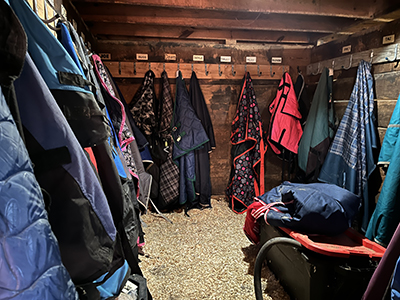
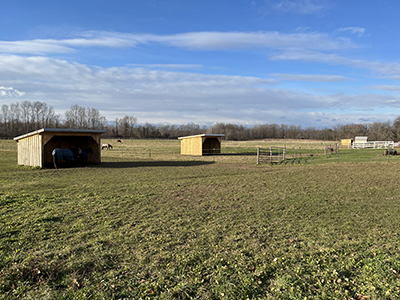
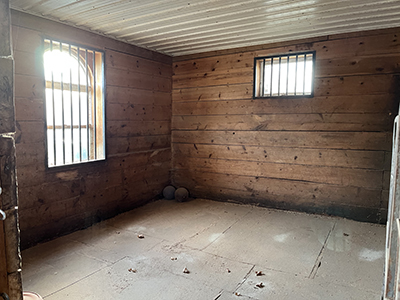
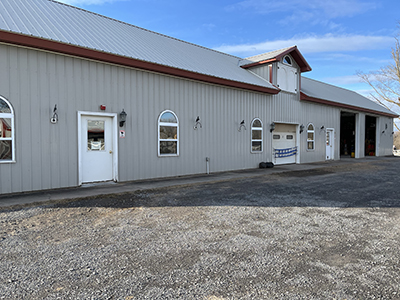

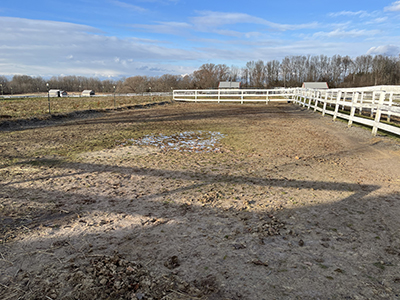
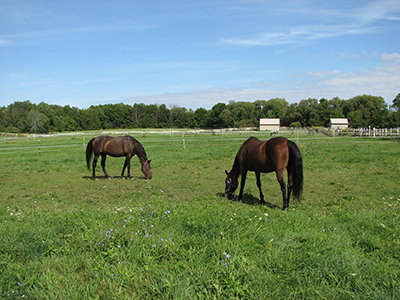
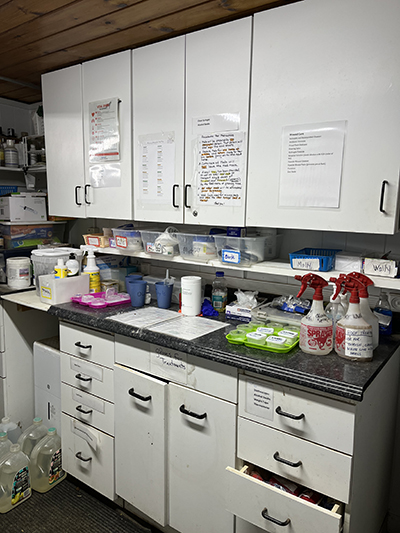

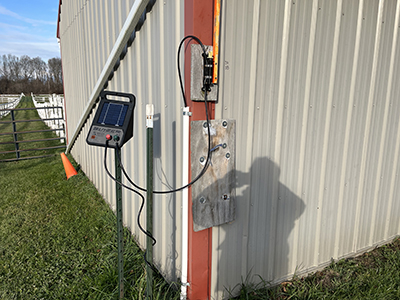
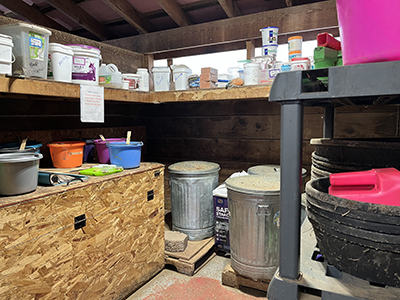
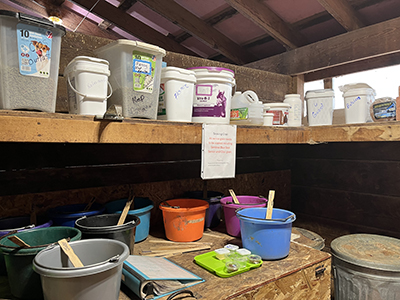



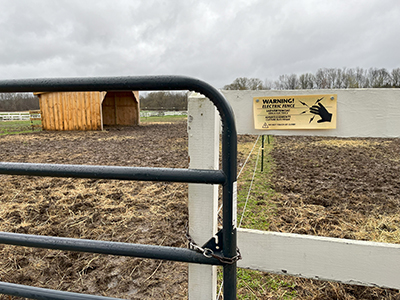
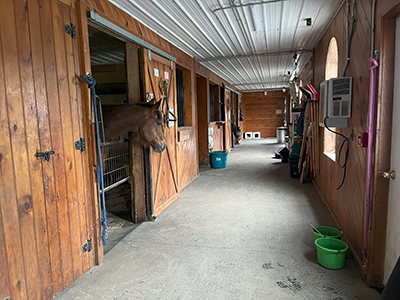
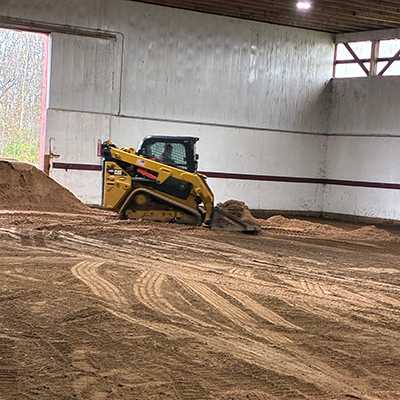

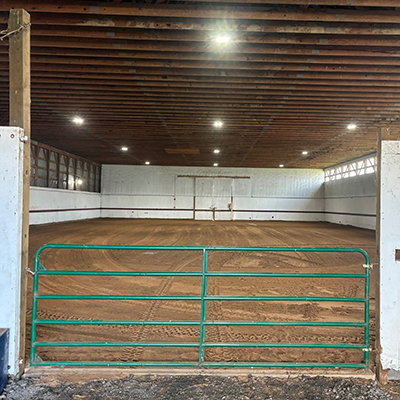
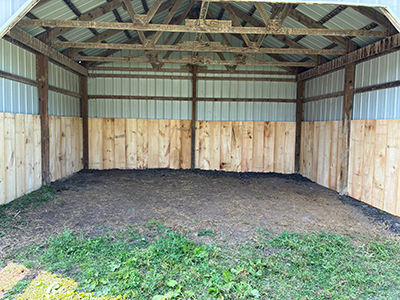

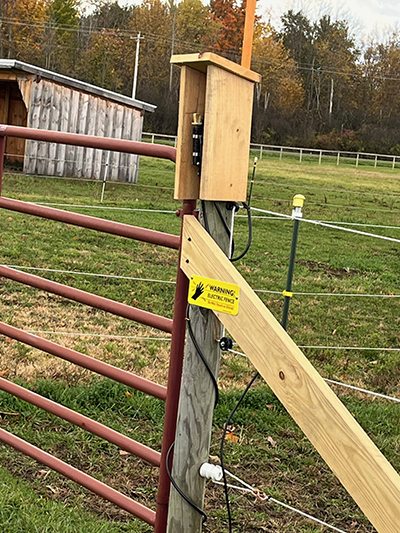
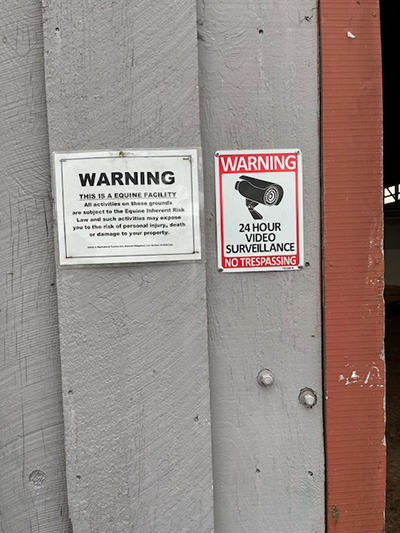
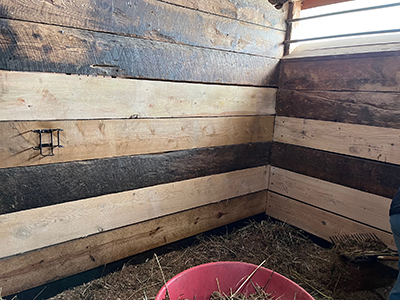
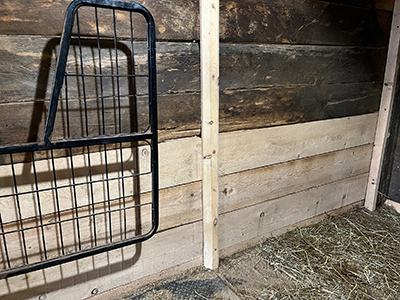
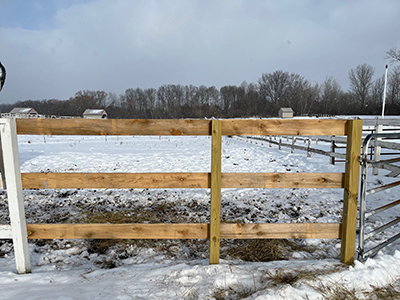
Are the organization's rules, restrictions and warnings (signage) conspicuously posted in easily accessible locations? Yes
Are the organization's emergency contacts, including veterinarian contact information, conspicuously posted in easily accessible locations? Yes
Are human and equine first aid kits easily accessible? Yes
Regarding all shelters where horses are housed including run-in sheds:
Do horses have assigned stalls in the barn/structure(s) or exclusively assigned shelter locations where they are separated from other horses with a barrier? Yes
How many hours per day, on average, are horses stalled or restricted to these sheltered exclusive shelter locations? 9-12
How often are the stalls/shelters cleaned, i.e., kept in good repair and free of standing water, accumulated waste, sharp objects and debris? 6-7 Days a Week
Do all stalls/shelters allow horses to lie down, stand up and turn around and provide protection from inclement weather (wind, sleet, rain, snow and extreme temperatures)? Yes
Are stalls/shelters kept in good repair, with adequate ceiling height, and free of standing water, accumulated waste, sharp objects and debris? Yes
Are floors constructed and maintained for both good drainage and traction? Yes
Is there a ventilation and circulation system in place to allow free flow of air to control temperature, and humidity, and to prevent air stagnation? Yes
Is wiring inaccessible to horses and maintained for safety in all areas of facility? Yes
Are fire prevention/protection measures (fire alarms, extinguishers and sprinkler systems) maintained and in good working order? Yes
Is there adequate lighting to ensure safety in all areas of facility? Yes
How many hours per day, on average, are horses turned out:
Equines are out 4 to 8 hours per day
Equines are out 9 to 15 hours per day
The following describes the pastures at this facility:
This facility has a written plan in place for pasture management, which includes guidelines for seeding, fertilizing, irrigation, mowing, dragging, harrowing, manure removal, removal of debris, the control of poisonous plants, and a schedule for cleaning
A dedicated staff person(s) is responsible for pasture management
All pastures are fenced to prevent escape or injury
Electric fencing is used; electric wires or tape fence are visibly marked
Fencing checks, such as broken or missing planks, loose fence posts, exposed or loose nails, detached wires, etc., are done regularly
Pastures are rotated
Pastures have natural protection for equines (i.e., trees)
Pastures have man-made protection for equines (i.e., shelters)
Not Checked:
This facility does not have pastures where equines can graze on pasture grass
Barbed wire is used for fencing
This facility does not have pastures where equines can graze on pasture grass
Barbed wire is used for fencing
The following describes the turnout areas other than pastures at this facility:
This facility has a written plan in place for the maintenance of turnout areas, which includes a schedule for cleaning, manure removal, and dragging
A dedicated staff person(s) is responsible for the maintenance of turnout areas
All turnout areas are fenced to prevent escape or injury
Electric fencing is used; electric wires or tape fence are visibly marked
Turnout areas have man-made protection for equines (i.e., shelters)
Fencing checks, such as broken or missing planks, loose fence posts, exposed or loose nails, detached wires, etc., are done regularly
Not Checked:
This facility does not have turnout areas
Barbed wire is used for fencing
This facility does not have turnout areas
Barbed wire is used for fencing
The following policies and procedures are in place at the facility to restrict public access and to keep horses safe:
By Appointment Only signs are posted.
No Trespassing signs are posted
Hold Harmless signs are posted
Authorized Personnel Only signs are posted
Visitors are only permitted at specific times
Visitors are only permitted in specific areas
The property is fitted with motion lights
The property is fitted with a security system that is monitored internally by staff (or the property owner)
Not Checked:
The property owner, staff member or caretaker lives on the premises and ensures that public access is restricted and is responsible for the security of the facility and equines
A security guard is present at night
There is a mechanism in place to monitor equines overnight
Entrance gates are locked at night
The property is fitted with a security system monitored by police or a professional service
The perimeter of the property is fully fenced
The property owner, staff member or caretaker lives on the premises and ensures that public access is restricted and is responsible for the security of the facility and equines
A security guard is present at night
There is a mechanism in place to monitor equines overnight
Entrance gates are locked at night
The property is fitted with a security system monitored by police or a professional service
The perimeter of the property is fully fenced
Equine Care/Emergency Preparedness: Sunshine Horses (*Main) 2026 and 2025 This section is required.
Horse Health Care/Barn Management Records: What system is used to collect and store health/horse care records?
Our organization utilizes a software application to maintain records
The organization utilizes its own system to maintain records
Our organization would use free cloud-based barn management software if available
The following items are consistent with our feed management plan and practices:
Equines are provided with individualized feeding plans, including supplements, according to the equine's age, breed/type, condition, size, work level and any health issues, consisting of nutritious food provided in sufficient quantity and access to adequate natural forage, or be fed daily, or as recommended by the organization's veterinarian
Feed plans are determined in consultation with a veterinarian
Supplement plans are determined in consultation with a veterinarian
Equines are fed grain in individual stalls
Staff and/or volunteers are trained in proper feed measurements and protocols and observed periodically to ensure they are feeding correctly
The feed chart is centrally located and updated as needed
The area(s) where hay, feed, grain, and supplements are stored are kept clean, free of debris and chemicals, and protected from weather and other animals in rodent-proof and mold-proof containers and grain bins
Feed, supplements and hay types are clearly labeled
Water sources, i.e., buckets, troughs, automatic waterers, etc. are kept clean, free of contaminants, debris and chemicals, protected from weather and other animals, and be positioned or affixed to minimize spillage.
Medications are kept in a secure area
Not Checked:
Equines are fed grain in groups
Equines are fed grain in groups
Is clean, potable water available at all times for all equines? Yes
Hoof Care: How often is hoof care provided for each equine? Every 4-8 weeks and when an issue arises
Dental Care: How often is dental care provided for each equine? Annually and when an issue arises
Horse checks: How often are equines visually and physically checked by personnel at the facility? Every day or 6 days a week
Our organization has the following parasite and fly/insect control protocols in place, including remedies used to control flies and insects:
Our organization follows the parasite control guidelines of our veterinarian, including fecal testing and de-worming
Fly/Insect Control Remedies:
Fly Traps and Tapes
Fly Spray Repellent
Fly Masks
Fly Sheets
Fans
Not Checked:
The following represent the biosecurity practices in place at facility:
Our organization follows the biosecurity guidelines of our veterinarian
Sick, affected and/or quarantined equines do not have contact with other equines or other animals
The organization has a written biosecurity plan
Volunteers are trained in best practices related to biosecurity
A specific individual is trained and assigned to care for sick, affected and/or quarantined equines
Sick, affected and/or quarantined equines are cared for last if the caretaker must also care for healthy equines
Restricted access signs are posted at primary points of access to sick, affected and/or quarantined equines
Hand sanitizers are available at all primary points of access to sick, affected and/or quarantined equines
Manure and bedding from sick, affected and/or quarantined equines is removed from the facility - not put in open air piles, and not spread on pastures
Quarantine areas, such as stalls, aisle ways, paddocks, and common areas, are cleaned (and needed, disinfected) after conclusion of the quarantine.
Trailers/vans used by sick, affected and/or quarantined equines are cleaned and disinfected after each use and cleaning takes place away from where equines are sheltered
Equipment used by sick, affected and/or quarantined equines is not shared
Latex gloves, or equivalent gloves, are worn when working with sick, affected and/or quarantined equines
Not Checked:
Staff are trained in best practices related to biosecurity
Footbaths are available at all primary points of access to sick, affected and/or quarantined equines
Equipment used by sick, affected and/or quarantined equines is cleaned of organic debris and disinfected after each use
Equines are not quarantined on arrival.
Staff are trained in best practices related to biosecurity
Footbaths are available at all primary points of access to sick, affected and/or quarantined equines
Equipment used by sick, affected and/or quarantined equines is cleaned of organic debris and disinfected after each use
Equines are not quarantined on arrival.
Additional information on biosecurity:
Daily documented assessment done with each quarantine horse which includes: temperature, respirations, heart rate, appetite, drinking, condition of stool, questions any drainage from eyes or nose, questions cough.
The following represent the manure removal practices in place at facility:
Manure is stored in dumpster(s)
Manure is hauled, sold or given away
Our organization adheres to the manure management guidelines set by the state, local authorities, and/or our organization's veterinarian
Not Checked:
Manure is piled in an area where equines are not located
Manure piles are covered
Manure piles are composted or spread on pastures
Manure is piled in an area where equines are not located
Manure piles are covered
Manure piles are composted or spread on pastures
The following steps are taken to help staff and volunteers readily identify each horse on the property:
Equines are assigned the same exclusive stall/shelter location each day
Name plates are located on the stall/shelter location
Photos are located on the stall/shelter location
Equines wear halters with nametags
A notebook or binder with photos and information on each equine is easily accessible
A map/diagram is posted showing the location of each equine with equine names and photos
Equine photos and profiles are available on the website
Staff/volunteers are provided training on conformation, markings, colors, and breeds
Team leaders work with new staff/volunteers until they are able to identify the equines
Not Checked:
Staff and volunteers are provided with an information packet with equine profiles, including photos and detailed descriptions
Staff and volunteers are provided with an information packet with equine profiles, including photos and detailed descriptions
Our organization has the following policies and procedures in place pertaining to tack, apparel and equipment:
Saddles are shared
Blankets, sheets and turn out apparel are fitted and utilized for each equine appropriate to the equine's needs and the weather conditions
Blankets, sheets and turn out apparel are cleaned regularly as needed
Riding Tack is cleaned only when needed
Riding Tack is inspected for overall working condition before each use by trained personnel
Riding Tack is assessed for fit before each use by trained personnel
Riding Tack is assessed for fit by trained personnel when an equine's body condition changes
Riding Tack is assessed for fit by trained personnel when an equine's disposition changes
Assigned riding tack is clearly labeled
Helmets are replaced after a fall
Helmets are replaced at least every five years.
Not Checked:
All equines have specifically assigned apparel, equipment and tack (saddles/bridles if ridden) that is not shared
Saddle pads are shared
Bridles are shared
Bits are shared
Blankets are shared
Sheets are shared
Turnout apparel is shared
Halters are shared
Riding Tack is always cleaned after each use
Riding Tack is always cleaned at least weekly
This facility enlists the services of a professional saddle fitter at least once a year
Riding Tack is stored in a climate-controlled location
Helmets are shared
Helmets are cleaned/disinfected after each use
No equines are ridden; saddles, bridles, etc. not applicable.
All equines have specifically assigned apparel, equipment and tack (saddles/bridles if ridden) that is not shared
Saddle pads are shared
Bridles are shared
Bits are shared
Blankets are shared
Sheets are shared
Turnout apparel is shared
Halters are shared
Riding Tack is always cleaned after each use
Riding Tack is always cleaned at least weekly
This facility enlists the services of a professional saddle fitter at least once a year
Riding Tack is stored in a climate-controlled location
Helmets are shared
Helmets are cleaned/disinfected after each use
No equines are ridden; saddles, bridles, etc. not applicable.
Emergency Preparedness: Sunshine Horses: *Main This section is required.
The following plans, policies, and procedures are in place at the facility to handle emergencies and address weather related issues, fire safety procedures, and/or any additional hazardous scenarios the facility could potentially experience:
Emergency procedures are posted prominently
The facility owns or has access to a generator
The facility maintains at least two weeks of hay, feed, shavings and medications
The facility collects and maintains medical information from staff, volunteers, and clients
The facility maintains appropriate liability and/or workers' compensation insurance
The organization has a written emergency preparedness/safety plan (EPP)
Not Checked:
The written EPP addresses the following areas: Local fire department and/or the state's emergency planning department procedures
Medical emergencies for clients, staff, and volunteers
Medical emergencies for equines
Evacuation plans
Power outages
Fire
Natural Disasters - thunderstorm, hurricanes, earthquakes, tornados, etc
Protocols to notify emergency personnel
Building/facility exit plans
Not Checked:
Terrorist attacks
Terrorist attacks
The facility follows the specific procedures to help PREVENT emergency situations:
Smoking is strictly prohibited
NO SMOKING signs are posted prominently
Hay is stored away from permanent or temporary structures where equines are stalled
Permanent or temporary structures where equines are stalled are kept free of dust, cobwebs, trash, cleaning rags, and other flammable items
Aisles and doorways are kept clear
Not Checked:
Heaters with automatic shutoff settings are used
Heaters with automatic shutoff settings are used
How often are the following checked or performed?
Fire Extinguishers are checked: Annually
Smoke detectors are checked: Semi-annually
Fence lines are checked: Daily
Turnout Areas are checked: Daily
Sprinkler systems are checked: Not at all/NA
Fire drills are conducted: Quarterly
Review of safety protocols with staff are conducted: Quarterly
Review of safety protocols with volunteers are conducted: Quarterly
The Emergency Preparedness Plan is reviewed and updated: Quarterly
Equine Transportation: 4= Onsite: 1 (1 + 0) + Offsite: 3
2-horse van/trailer with truck:
1 Owned onsite 1 Access offsite;
3-horse van/trailer with truck:
1 Access offsite;
4-horse van/trailer with truck:
1 Access offsite;
DISCLAIMER: The listing of this organization on this site is not an endorsement. EQUUS Foundation Guardians receive a star rating of 4 being the highest to 1 being the lowest based on the degree to which the organization meets the EQUUS Foundation standards for equine welfare and business practices.
If you have concerns about this organization, please contact us here.
© Copyright 2018 EQUUS Foundation 1252 4.00
© Copyright 2018 EQUUS Foundation 1252 4.00